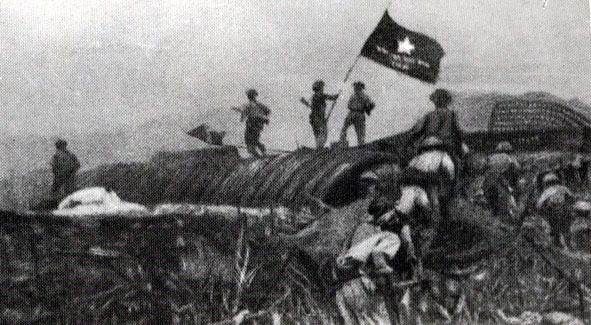The death has been announced in Hanoi of Vo Nguyen Giap, the self-taught general who drove the French out of Vietnam. His generalship at the pivotal battle of Dien Bien Phu, freeing the North from colonial rule and then later forcing the Americans to abandon their support for the various regimes in South Vietnam, was largely responsible for the eventual re-unification of the country under a communist government in Hanoi.
Giap is probably not as well known as the events in Vietnam in which he was pivotal, but the impact of the American experiences in south-east Asia on popular culture has been immense. Much of that popular culture output, either in film, music or literature largely arises from the experiences of US forces under pressure from Vietnamese units under Giaps strategic and tactical direction. Whilst the US experience in Vietnam may well dominate news coverage of Giaps death, it was his role in the defeat of the French in 1954 that had already sealed his place in twentieth century history.
Giap was central to the French decision to abandon its IndoChine territories. The battle of Dien Bien Phu, where Giap’s supposedly disorganised peasant army managed the logistical and tactical challenges of besieging and pounding a stronghold of crack French troops into submission, has lent itself to some of the best battlefield literature of the twentieth century. The material – Giap’s naive Vietnamese army, the difficult terrain, the French and colonial paratroopers, the Foreign Legion and its mishmash of European exiles, the long range commando teams, the US pilots and the dehumanising experience of both sides in the midst of the ever-shrinking battlefield make for compelling reading. Notably, one of the main French commanders at Dien Bien Phu, Marcel Bigeard, only died in 2010.
Dien Bien Phu was a salutary lesson in the realities of colonial adventure in the mid-twentieth century and exposed a lesson that the neo-colonial powers like the US were extraordinarily slow to grasp (read Michael Herr in Dispatches on the frequency with which it was cited in the 1960s). Bizarrely (in retrospect), the French were lampooned for the speed with which they disengaged from south-east Asia. Even in French terms, the lessons learnt from Giap in post-war colonialism were rapidly forgotten once they got back to their northern African holdings. The legacy of territories and political entities carved out in the western retreat from its various colonial adventures continues to be a major undercurrent in todays news.
Here is a brief reading list worth keeping an eye out for (presuming some will be dusted off and pushed the front shelves of bookshops over the next week). Windrow’s is the best overall review (its only a few years old and has the advantage of hindsight). Similarly, Simpsons has more of the benefit of hindsight and distance. The near contemporary accounts written by Bernard Fall and Jules Roy effectively recount the story from behind the lines (Roy) with all the high-level gossip, and from deep in the trenches (Fall). The bloodiest account is Grauwins – he was the chief medical officer during the battle (it’s rare but worth reading). Giap himself has also written about the battle in his book, Ðiện Biên Phủ, but I’ve never seen it in translation.
The Last Valley: Dien Bien Phu and the French Defeat in Vietnam by Martin Windrow
Hell In A Very Small Place: The Siege Of Dien Bien Phu by Bernard Fall
Dien Bien Phu: The Epic Battle America Forgot by Howard R. Simpson
The Battle of Dienbienphu by Jules Roy
Doctor at Dien-Bien-Phu by Paul Grauwin
Discover more from Slugger O'Toole
Subscribe to get the latest posts to your email.
